Many people love eggplants because of their mild, sweet flavor. Growing them in your garden can be very rewarding. You might wonder if eggplants are self-pollinating. We've researched this topic and have information to share with you.
Eggplants are self-pollinating. Their blossoms contain both anthers and pistils. Anthers produce pollen, and pistils receive pollen. Wind and flying insects such as bees can also help complete pollination.
Eggplants are easy to grow but also require care. Continue reading to learn how to grow them successfully for a fruitful yield and why they still need pollinators to produce healthy fruit.
Do Eggplants Self-Pollinate?
Eggplants or aubergines are self-pollinating. They have perfect flowers holding the stamen and pistil, which are essential in reproduction. The stamen carries anthers that generate pollen, and the pistil receives pollen from the stamen.
Although eggplants are self-pollinating, that does not guarantee productivity. Without the help of pollinators such as wind and bees, they may not produce fruit. Manual pollination may also help to ensure that your plants produce fruit.
Wind pollination occurs when the wind sways the flower and the pollen shifts from the anther to the pistil. Buzz breeding happens when bees touch the anthers and shake themselves. The shaking then allows the pollen from the anther to transfer into the pistil.
When the pollen reaches the pistil, fertilization occurs, and fruit starts to emerge. The flower will then wither and fall, allowing the fruit to grow.
Some circumstances make it hard for eggplants to self-pollinate. Here are some conditions you can check.
- Hot climate or weather (heat can make the pollen infertile0
- Too much moisture in the air
- Windy environment
- Presence of pests and wild animals
- Frail eggplants
- Use of pesticides
How To Hand Pollinate An Eggplant
Aside from wind and buzz pollination, you can hand pollinate your eggplants to help them bear fruits. Although eggplants have perfect or complete flowers, they may have difficulty with fertilization and need to be hand pollinated.
Here are some simple methods for manually pollinating your eggplants.
Pat The Blossoms
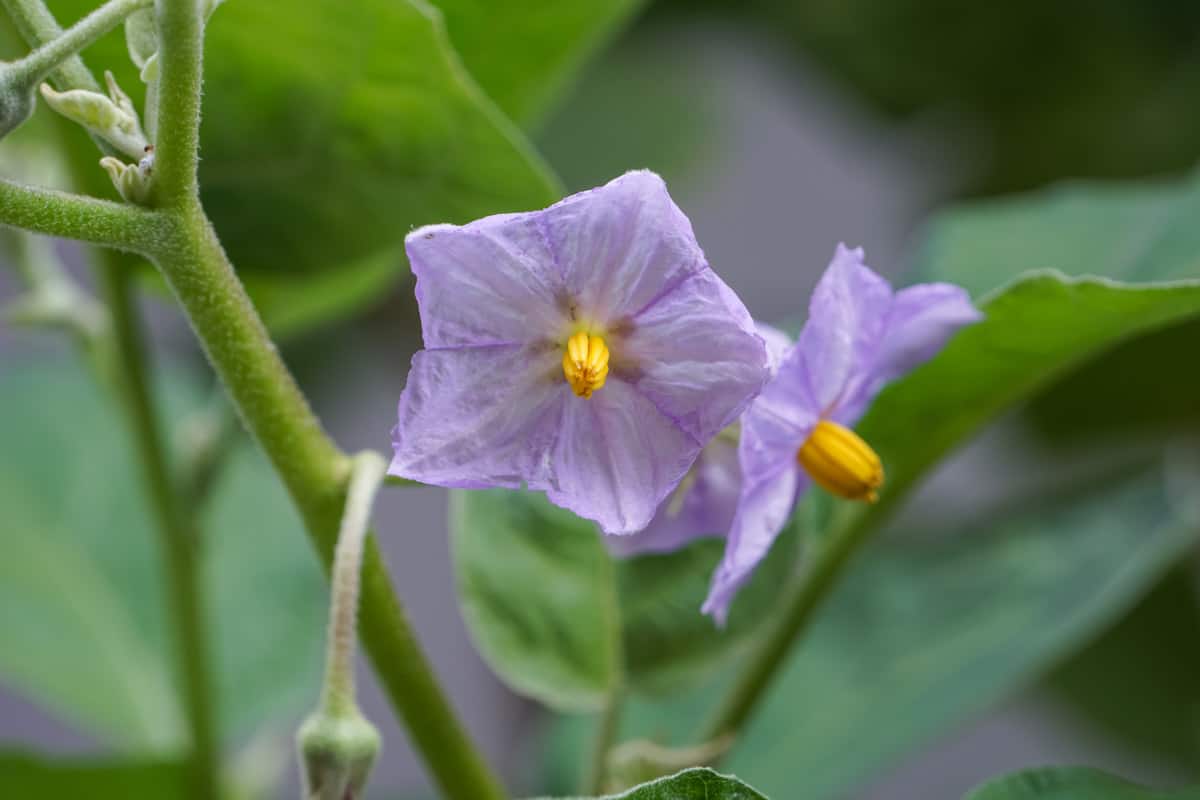
Gently hitting your eggplant's flower is one easy way to pollinate it. Just gently hit the bottom part of the flower three to five times. Tapping the flower will allow the pollen to shift from the anther to the pistil.
Brush The Flowers
This method is a substitute for the bees doing their job. Using an electric toothbrush, you can imitate bees' vibrations for buzz pollination.
Press your electric toothbrush against the bottom part of the flower for three seconds. The trembling from the brush will let the pollen transfer from the anther to the stigma.
Click here to see this electric toothbrush on Amazon.
Use A Cotton Swab
This method also imitates bees' actions when touching one flower and another. Stroke the inside of the flower with a cotton swab until pollen comes out of the flower's tissues. Then gently touch another flower with the cotton swab, tapping the flower's pollen onto the pistil.
To learn more, check out this video on how to hand-pollinate eggplant flowers.
Why Aren't My Eggplants Yielding Fruit?
There are many possible reasons why your eggplants may not produce fruit. Here are some factors that may affect their productivity.
Absence Of Pollination
Even though an eggplant blossom is self-pollinating, it still needs pollinators to completely fertilize the flower's stigma. A slight breeze and flying insects such as bees, moths, and butterflies will aid with pollination.
However, there will be times the pollen gets too gluey because of high temperatures and excessive moisture in the air. It can be difficult for the pollen to shift from the anther to the pistil. That's when you have to hand pollinate your flowers to ensure productivity.
Severe Temperatures
A severe climate may affect an eggplant's productivity. Extremely hot weather or cold weather can hamper an eggplant's ability to set fruits.
A temperature lower than 60 degrees Fahrenheit may result in your flowers dropping and not bearing fruit. Extremely cold temperatures can prevent your eggplants from thriving.
Temperatures higher than 90 degrees Fahrenheit can cause your flowers to become infertile. A sudden temperature change can also affect your plants' overall health causing them to stop bearing fruit until the climate becomes stable.
Eggplants thrive best when exposed to full sunlight but may need protection from the sun's damaging rays during the hottest time of the day. A garden shade cloth will shield your plants from direct sunlight during mid-afternoon when it's hottest.
See this garden shade cloth on Amazon.
Insufficient Water
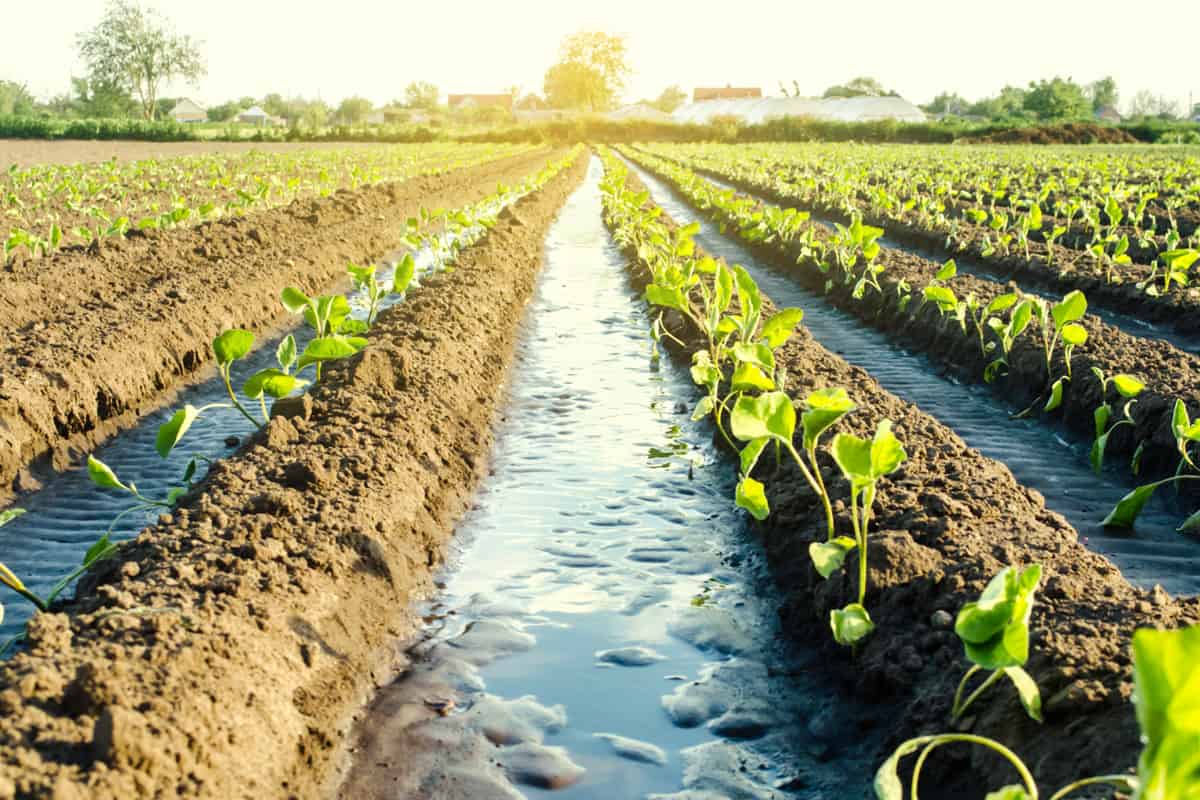
Eggplants need plenty of water. Insufficient water can damage your eggplants and cause blossoms to drop, leading to a lack of fruit.
If the blossoms drop during the summer, it is probably because of a lack of water. To ensure your eggplants stay hydrated, use a rain gauge to check the moisture in the soil.
In areas with moderate temperatures, eggplants need one inch of water every week. During severe hot weather, they will need two inches of water every week.
Poor Soil
The soil for your eggplants plays a significant part in their productivity. Do not plant them in waterlogged soil. Wet soil can cause the plants to decay.
Eggplants thrive best in drained, grainy soil abundant in nutrients like nitrogen and phosphorous, which will help the plant bear fruit. To ensure nutrient-rich soil for your eggplants, add organic fertilizer.
The use of organic compost will help you achieve nutrient-rich soil for your eggplants. You should add a compost covering of at least four to six inches.
Click here to see this organic fertilizer on Amazon.
Presence Of Pests
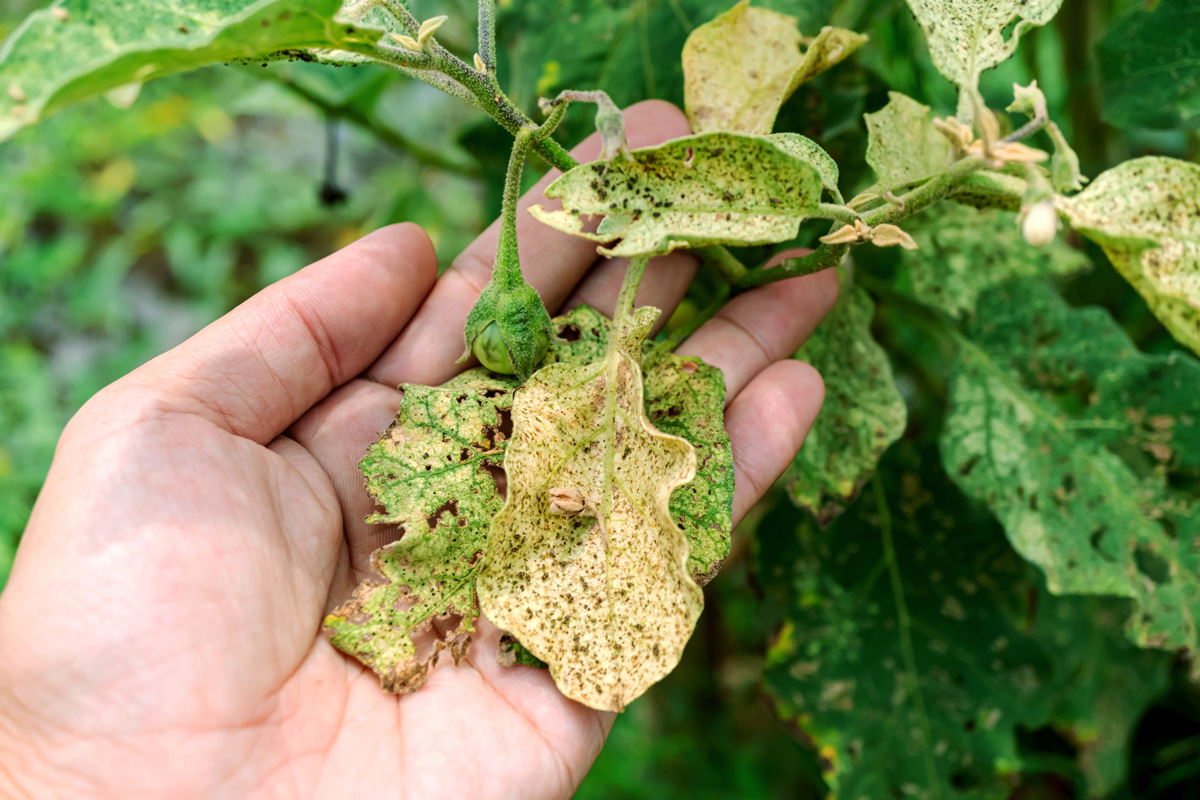
Your plants may not be bearing fruit because of pests or disease. Regularly check your plant leaves for insects, as they can stunt the growth and development of your plants.
Here are some eggplant insects and pests you can check for:
- Colorado potato beetle: This insect sucks the leaves of eggplants and can cause serious damage to your plants.
- Hornworm: This large caterpillar will feed on your plant's leaves.
- Aphid and whitefly: They sip the sap from the eggplant's foliage and stems and are primarily found on the base of the leaves.
- Spider mite: This insect pulls the sap from the plant's foliage.
- Stink bug and leaf-footed bug: These insects munch on a growing fruit.
- Flea beetle: It munches on leaves, resulting in holes.
Planting The Wrong Eggplant Variety
Eggplants grow well in hot weather and may not survive in winter. When you choose a variety that has a long time to mature, you may have an autumn harvest.
Before purchasing eggplant seeds, check the days to maturity indicated on the pack. If you plan to plant in short seasons, pick a variety that will mature early, like Applegreen, Morden Midget, Ping Tung Long, or Early Black Egg.
You may start planting seedlings in the middle of February or as soon as frost and winter have ended. An ideal planting time will result in an abundant harvest of quality fruit.
How To Determine If Your Eggplants Are Ready To Pick
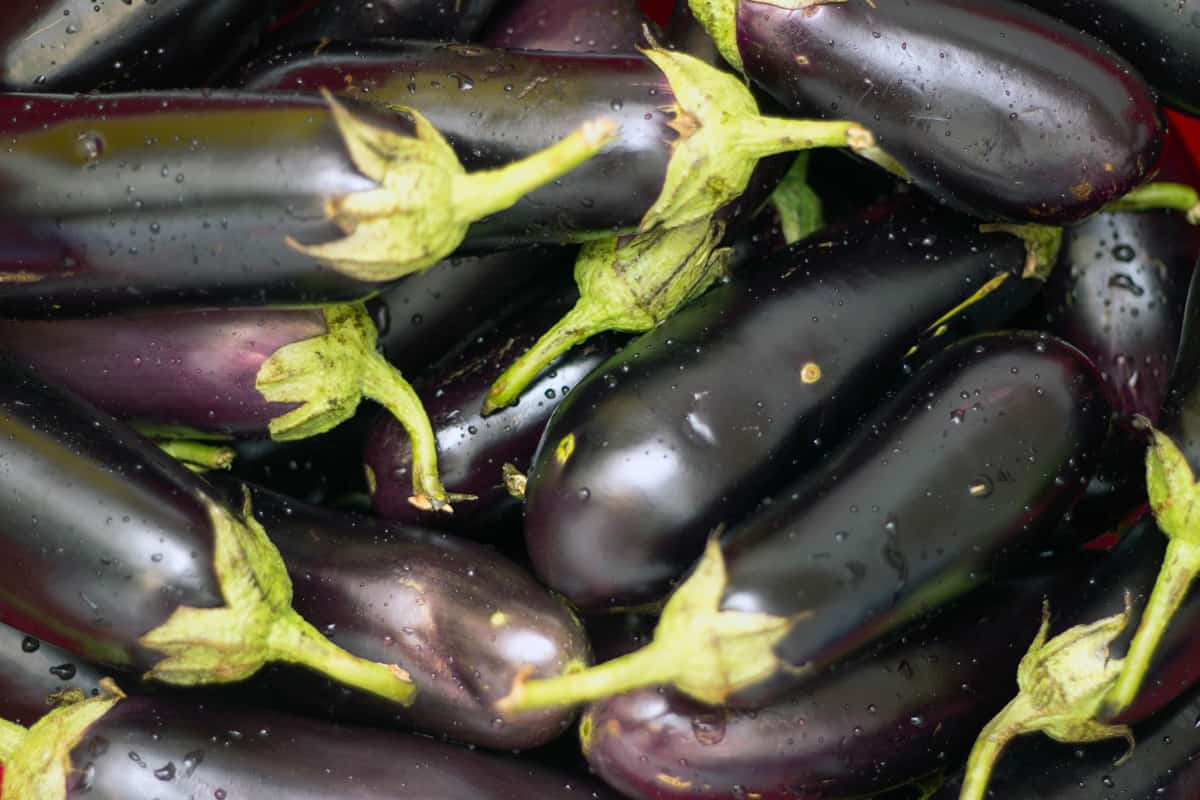
Harvesting your fruits can be satisfying, but knowing when to pick them is very important. Harvesting fruits at the perfect time will result in tasty, juicy fruit. Harvesting too late will result in eggplants with a bitter flavor and hard skin.
You can begin harvesting 65 to 80 days after planting a seedling. If you started with a seed, you may wait 100 to 120 days for harvest.
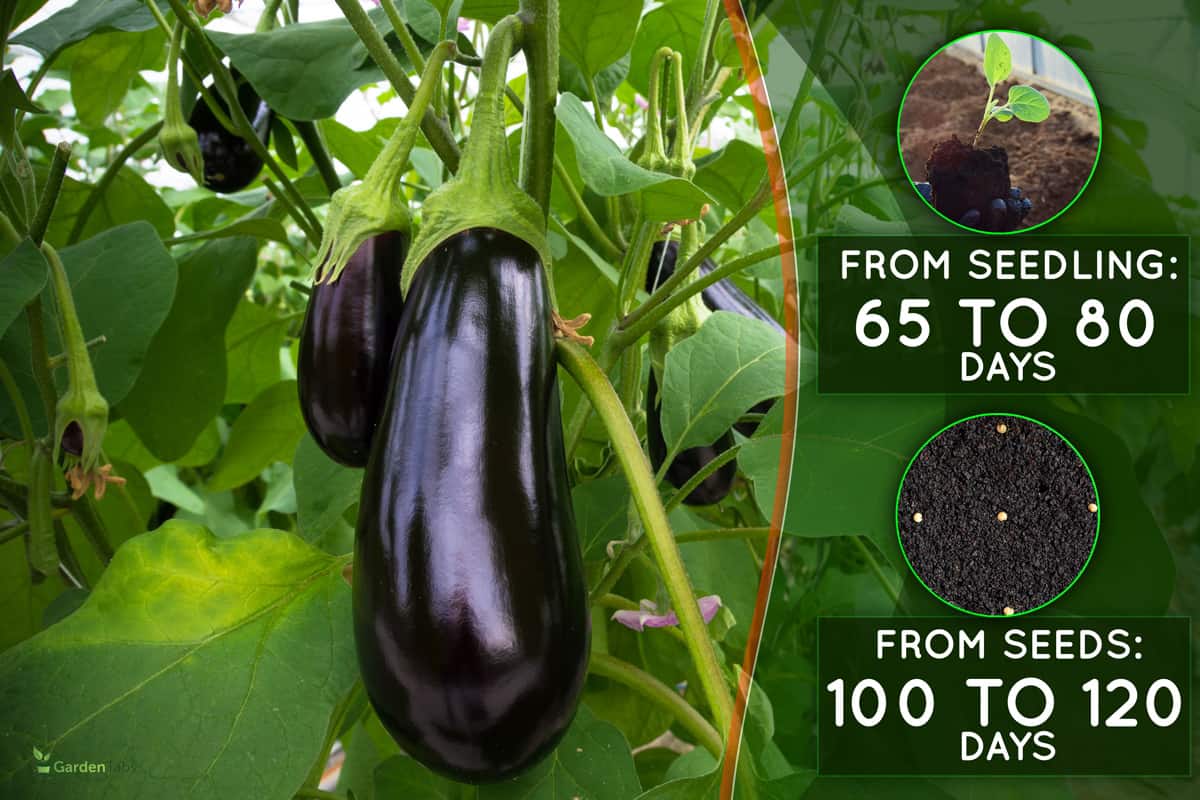
To know whether your fruits are ripe and ready for harvest, check the skin. The fruit's cuticle should be shiny and slim, and the fruit should be firm to the touch.
You may check one eggplant and see if its meat is cream in color. If it is, the fruit is ready for harvest. The size and color of the fruit are also deciding factors for harvesting.
In Closing
A healthy, fruit-bearing eggplant can be truly rewarding. Climate conditions, pollinators, and pests contribute to an eggplant's overall health and well-being.
Now that you know how to take care of your eggplants and what conditions will support their best growth and productivity, you can start growing healthier eggplants at home.
If you found this post helpful, check out these related articles:



